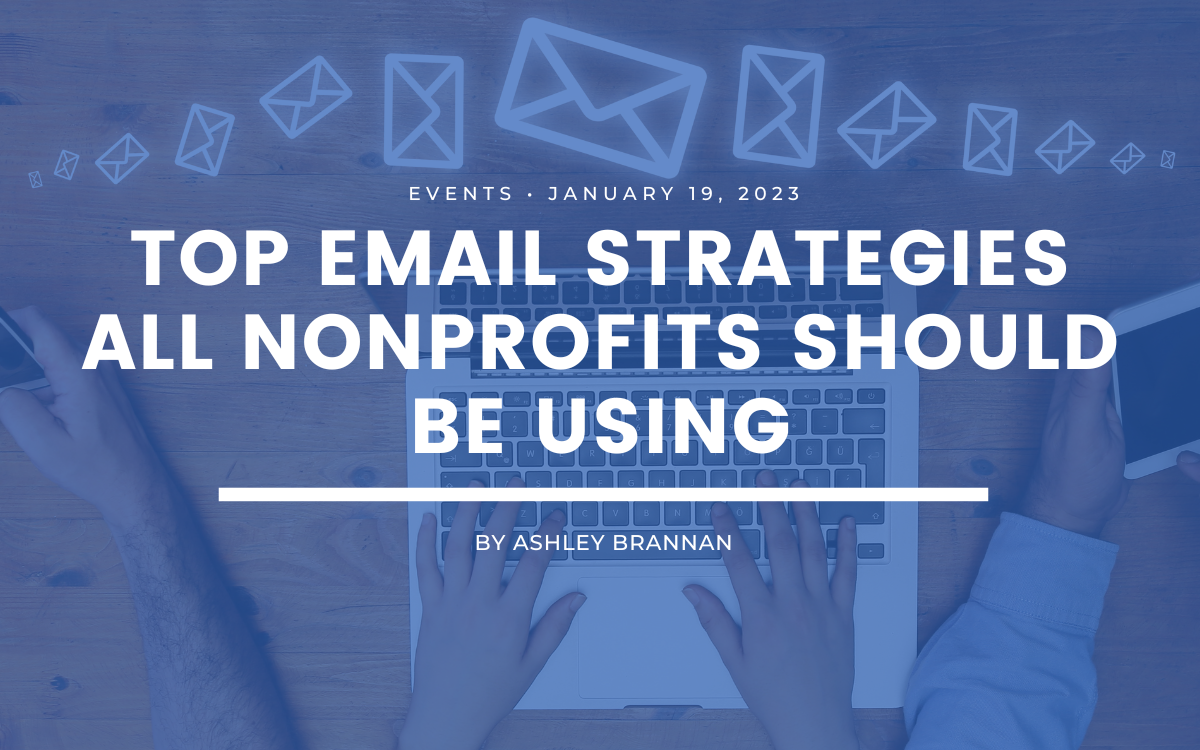Top Email Strategies All Nonprofits Should Be Using
8 min to read ✭
Email marketing is an essential tool for nonprofit organizations to reach out to their supporters, donors, and volunteers. It allows them to stay connected with their audience, share updates about their cause, and solicit donations and other forms of support.
With a low cost and the ability to reach a large audience, email marketing can be an effective way for nonprofits to promote their mission and drive engagement with their cause. By carefully crafting emails and utilizing email strategies such as personalization and automation, nonprofits can maximize the impact of their email marketing efforts. Here are the top strategies that nonprofits should consider using in their email marketing efforts:
Download The Email Marketing Guide For FREE
Personalization
Personalization is a powerful tool for your email marketing strategies, and it can be especially effective for nonprofits. By using the recipient’s name in the subject line and body of the email, you can make the message feel more targeted and personalized, which can increase the chances of the email being opened and read. In addition, segmenting your email list and sending targeted messages to different groups of people can be an effective way to personalize your email marketing efforts. For example, you could send different emails to donors, volunteers, and supporters, depending on their interests and engagement with your organization.
Other types of personalization that can be effective for nonprofits include using location-specific information, such as sending an email about a local event to recipients in the area, or using data about the recipient’s past interactions with your organization to tailor the content of the email. Overall, personalization in email marketing can help nonprofit organizations to build stronger connections with their audience and drive more engagement with their cause.
Mobile-friendly design
Designing emails to be mobile-friendly is important because an increasing number of people are using their smartphones to check their emails. In fact, studies have shown that over 50% of emails are now opened on mobile devices. If your emails are not easily readable on mobile devices, you risk losing the attention of your audience and potentially even causing them to unsubscribe.
To design emails that are mobile-friendly, there are several key considerations to keep in mind. First, it is important to use a responsive design, which means that the layout of the email will automatically adjust to the size of the screen it is being viewed on. This can help ensure that your emails are easy to read on any device. In addition, it is a good idea to keep the subject line and preheader text short, as these will be the first things that the recipient sees when they receive your email. Finally, using large, easy-to-read fonts can also help make your emails more mobile-friendly.
Email automation
Email automation is a powerful tool for nonprofits because it allows them to send trigger-based emails to their subscribers without having to manually send each message. This can save time and ensure that the right message is being sent to the right person at the right time.
Connect With An Expert on Email Automation
There are several common email automation that nonprofits should consider using. One example is the welcome email, which can be sent to new subscribers to introduce them to the organization and provide information about how they can get involved. Another common automation is the abandoned cart email, which can be sent to potential donors who have added items to their online cart but have not completed the donation process. This email can help to remind the recipient of their intent to donate and encourage them to complete the process.
In addition to this automation, nonprofits can also set up trigger-based emails for events, such as sending a reminder email to attendees a few days before the event, or a follow-up email to thank attendees for their support. Overall, email automation can be a powerful and impactful tool for nonprofits, helping them to save time and effectively reach out to their audience.
A/B testing
A/B testing in email marketing can benefit nonprofit organizations by allowing them to test different versions of their emails to determine which one is more effective at achieving their desired goals. This could include testing the subject line, the layout of the email, the use of images, and the language used in the email.
By analyzing the results of the A/B test, the nonprofit can make informed decisions about how to optimize their email marketing campaigns and ultimately drive more donations, volunteers, or other desired actions from their supporters. Additionally, A/B testing can help nonprofit organizations save time and resources by identifying which elements of their emails are most effective, rather than conducting extensive testing on every aspect of their email campaigns.
Email data privacy
With the increasing concerns about data privacy, it is essential to make sure that you are respecting your subscribers’ privacy. This includes being transparent about how you are using their data and obtaining explicit consent before sending emails.
There are several laws that govern email privacy, including the General Data Protection Regulation (GDPR) in the European Union and the California Consumer Privacy Act (CCPA) in the United States. To abide by these laws, it is important for organizations to obtain explicit consent from individuals before sending them marketing emails. This means that the individual must actively opt-in to receive emails, rather than being automatically added to an email list. Organizations should also provide a clear and easy-to-use method for individuals to opt-out of receiving emails at any time. Additionally, it is important to protect the personal data of individuals by using secure servers and encryption when collecting and storing email addresses. Organizations should also have a clear privacy policy in place that explains how they will use the personal data of their email subscribers.
In summary, email marketing is a powerful tool for nonprofit organizations. By personalizing emails, making them mobile-friendly, using email automation, A/B testing, and respecting email data privacy, you can effectively reach out to your supporters and drive engagement with your cause. These additional email strategies can get your nonprofit going in a successful direction.






